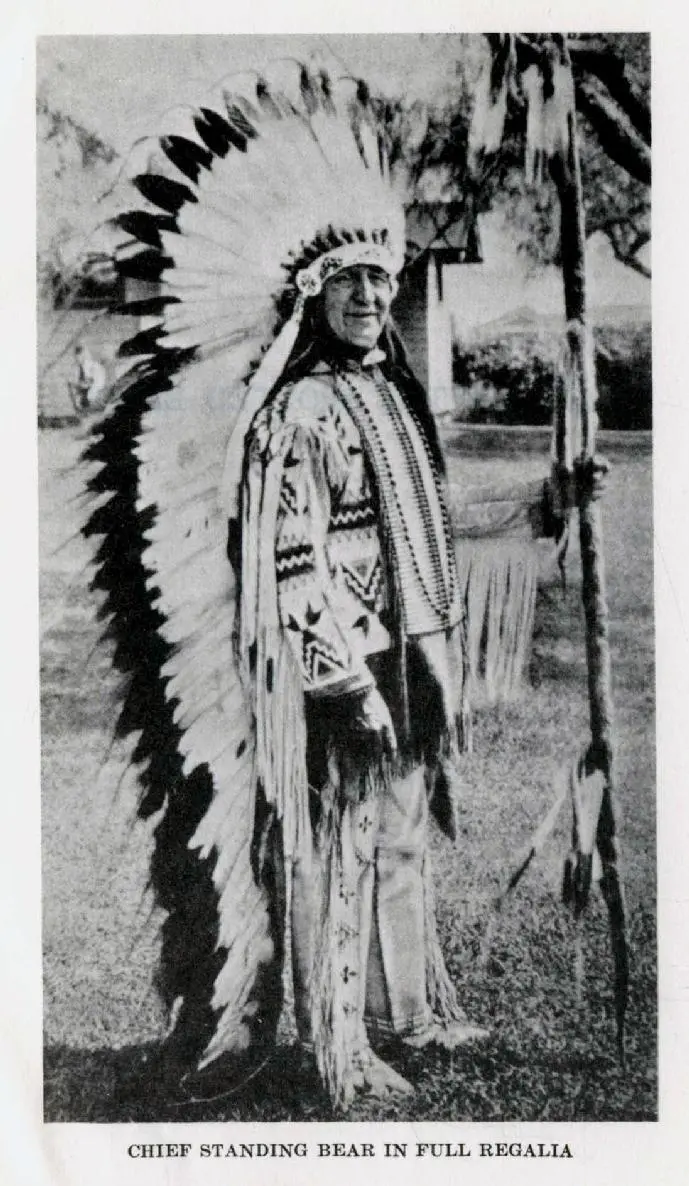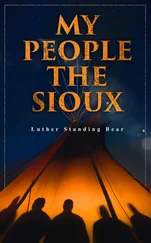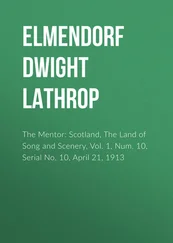Luther Standing Bear
Land of the Spotted Eagle: The Lakota Life and Customs
Published by

Books
- Advanced Digital Solutions & High-Quality eBook Formatting -
musaicumbooks@okpublishing.info
2021 OK Publishing
EAN 4066338113450
Preface
Explanatory Note
Introduction
Chapter I. Cradle Days
Chapter II. Boyhood
Chapter III. Hunter, Scout, Warrior
Chapter IV. Home and Family
Chapter V. Civil Arrangements: Bands, Chiefs, Lodges
Chapter VI. Social Customs
Chapter VII. Indian Wisdom
Chapter VIII. Later Days
Chapter IX. What the Indian Means to America

It is this loss of faith that has left a void in Indian life—a void that civilization cannot fill. The old life was attuned to nature’s rhythm—bound in mystical ties to the sun, moon and stars; to the waving grasses, flowing streams and whispering winds. It is not a question (as so many white writers like to state it) of the white man “bringing the Indian up to his plane of thought and action.” It is rather a case where the white man had better grasp some of the Indian’s spiritual strength. I protest against calling my people savages. How can the Indian, sharing all the virtues of the white man, be justly called a savage? The white race today is but half civilized and unable to order his life into ways of peace and righteousness.
Luther Standing Bear, “The Tragedy of the Sioux,”
American Mercury 24, no. 95 (November 1931): 277.
Table of Contents
In this book I attempt to tell my readers just how we lived as Lakotans—our customs, manners, experiences, and traditions—the things that make all men what they are. There are reasons why men live as they do, think as they do, and practice as they do; hence, there were forces that made the Lakota the man he was.
White men seem to have difficulty in realizing that people who live differently from themselves still might be traveling the upward and progressive road of life.
After nearly four hundred years’ living upon this continent, it is still popular conception, on the part of the Caucasian mind, to regard the native American as a savage, meaning that he is low in thought and feeling, and cruel in acts; that he is a heathen, meaning that he is incapable, therefore void, of high philosophical thought concerning life and life’s relations. For this ‘savage’ the white man has little brotherly love and little understanding. From the Indian the white man stands off and aloof, scarcely deigning to speak or to touch his hand in human fellowship.
To the white man many things done by the Indian are inexplicable, though he continues to write much of the visible and exterior life with explanations that are more often than not erroneous. The inner life of the Indian is, of course, a closed book to the white man.
So from the pages of this book I speak for the Lakota—the tribe of my birth. I have told of his outward life and tried to tell something of his inner life—ideals, religion, concepts of kindness and brotherhood; of laws of conduct and how we strove to arrive at arrangements of equity and justice.
The Lakotas are now a sad, silent, and unprogressive people suffering the fate of all oppressed. Today you see but a shattered specimen, a caricature, if you please, of the man that once was. Did a kind, wise, helpful, and benevolent conqueror bring this situation about? Can a real, true, genuinely superior social order work such havoc? Did not the native American possess human qualities of worth had the Caucasian but been able to discern and accept them; and did not an overweening sense of superiority bring about this blindness?
These questions may be answered in the light of the reader’s sense of justice and quality of imagination. As for myself I risk this indulgence and say: Of my old life I have much to remember with pride. There were among us men of vision and humane ideals; there were great honesty and loyalty; beautiful faith and humility; noble sacrifice and lofty concepts. We were unselfish and devout. In some instances we attained notable success, and we were on the way. On the whole, we succeeded as well in being good and creditable members of our society as do many of the dominant world in being good members of their citizenry.
Nevertheless, Indian life has been enriched with fine and understanding white friends, and one such, a man of true nobility, has been of inestimable value to me in reading my manuscript and offering suggestions—Professor Melvin Gilmore, Curator of Ethnology for the University of Michigan, Ann Arbor, Michigan, himself an author. As a botanist of recognized standing he made valuable suggestions, and his keen technical knowledge refreshed my memory that had become somewhat dimmed through a broken contact with the land of my birth. To Professor Gilmore I express my sincerest appreciation, not only for his assistance in this particular work, but for his fidelity in portraying the Sioux people in his published works.
My last word is to give credit to my niece and secretary, Wahcaziwin, who now assists me in writing and editing. All former difficulty has been eliminated, since my hardest work came in making myself understood in all the details and intricacies of Indian thought and life. But Wahcaziwin has a broad and complete understanding of her own, and when I speak she fully understands.
Chief Standing Bear
Table of Contents
Lakota is the tribal name of the western bands of Plains people now known as the Sioux, the eastern bands calling themselves Dakotas. The word Sioux is not an Indian but a French word, and since the author is dealing with the tribal customs of his people, he chooses to use the ancient tribal name of the band to which he belongs.
Table of Contents
I have often thought it a great pity that our people, the European race, should have burst in upon this land of America and spread ourselves over it as we did in the manner of unsympathetic aliens instead of introducing ourselves as prospective friends, desiring to become fully acquainted with the native features of beauty and of interest in the land, and with the admirable qualities of its people. The native people were able, willing, and ready to be our guides, and to put us at ease in the land which was their home, and to make us feel at home in it also. But we preferred to begin, and to carry on, so far as possible, the removal and destruction of all the belongings of this home and to substitute for them, whether fitting or not, the belongings of our former home in Europe. So we proceeded to destroy instead of adapting and enriching America. We began merely to try to build a New Spain, a New France, a New Netherlands, and a New England. Instead of accepting the good gifts of this new land and people, and adding to them desirable gifts from our own store, thus completely furnishing a really new and handsome home, we spurned them, and our endeavor has resulted in destroying untold native beauty and desirable character, in place of which we have succeeded in establishing a second-hand establishment, furnished out with many of the belongings of the old home to which we were accustomed, but lacking here their proper sense of fitness and independence. We have destroyed and driven out many delightful native birds and in their place have introduced such pests as the starling and the house sparrow. We have changed the landscape, and over extensive areas have destroyed all the native vegetation, and instead of exquisitely beautiful and richly varied native flowers appearing in continually successive waves of color throughout the round of the seasons, both in forest and prairie, we now have burdock, mullein, dandelion, and wild carrot and other boisterous intruders.
Читать дальше














